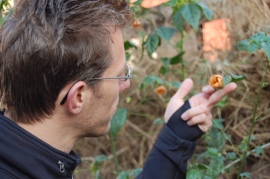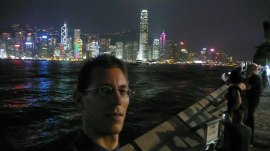Cultural anthropologist Gerald Zhang-Schmidt argues that the modern terra incognita is found in the mysteries of culture rather than the frontiers of space.
Blank Spots on the Modern Map
Exploration seems a thing of the past. All that’s left is the frontier of space, but “to boldly go where no man has gone before” is the domain of science fiction (at least so far). Nowadays, if you want to become known through adventure, you have to run up mountains or be the first to traverse all of a continent running. Yet these are physical feats, not feats that serve the purpose of discovering something new. The blank spots on Earth, the “here be dragons” have been visited. The adventurous traveler must content himself with other perils: the local who serves him dog to eat. There are no more dragons. In fact, nowadays, there may be tourists there, and an internet café just around the corner.
Only too often, though, the familiarity hides other kinds of blank spots. In this age of tourists and adventurers, cultural anthropologists are a case of people in-between. Traditionally, they were quite close to explorers. Cultural anthropologists, of course, have sought out exotic peoples rather than peculiar geographies; reaching an uninhabited North Pole has no use when you seek to understand human cultures, after all. They also have different methods: it is standard practice to conduct long-term fieldwork with one group of people, not range far and wide. Anthropologists’ acceptance of “cultural relativism” has also, at times, separated them from explorers: one needs to understand a cultural phenomenon from within the logic of the society it belongs to, not interpret and judge it from the perspective of one’s own cultural background.
Still, cultural anthropologists were oftentimes quite public figures, rather like explorers, becoming well known for bringing back news of “the other” and their exotic ways. The whole fascination of the discipline, after all, came from the stories of persons who went out to live among other – maybe “primitive,” maybe just different – peoples and regaled us with stories of how diverse and wondrous human diversity is. Even when Japan experienced its economic boom of the 1980’s, a large part of the fascination was their different ways of thinking and acting (expressed even in popular culture, e.g. the James Bond movie “You Only Live Twice,” or Michael Crichton’s novel – and the movie adaptation of it – “Rising Sun”). Recently, China has taken over the role of the powerful, yet mysterious, Asian rival that is increasingly close, yet strangely different.
Here we come full circle to how today is different: one can no longer go out to many places where no tourist has tread before. In fact, because of globalization, the traveler feels as if she has seen the world already, and while many places are still fun to visit (if exotic enough), there is nothing truly new.
Yet, even as the formerly exotic “Other” has come increasingly close – with economic globalization, with international migration – it is all the more unknown. It is even rejected for being too close for comfort, if it does not meet our terms of engagement. You find “Chinese” food virtually everywhere, but adapted to the local palate rather than how it is in China (and not just by omitting dog from the menu); you find “American culture,” but it’s really just Hollywood and McDonald’s, blue jeans and pizza.
It may not be possible to go out and find something new that will make one known as the first person to have seen it. However, the exploration of blank spots of our own personal knowledge, hidden by the superficial familiarity gained from TV and internet, has become all the more important, and worthwhile – and it is a whole treasure trove of possible experiences: about other peoples, about this planet’s ecology, and often beginning with our own cities and neighborhoods. How well do you know the people and paths in your community or the species that dwell in your own backyard?
Gerald Zhang-Schmidt is a cultural anthropologist and ecologist from Austria, specialized on East Asia. For the last two and a half years he has been living in China, working as German lecturer while researching and writing on what it means to be “at
home… in China”. He is also working on the ecology of happiness and has an enduring fascination with chili peppers and their cultural-culinary significance.
















Great reflection. I’ve had very similar thoughts while living in Korea for the past few years. Exploring in the 21st century is much more of a mental challenge than a physical one and because of that, I think, much more difficult. When Livingstone traveled through Africa he had little choice but to learn a local language(s), eat local food, and interact with locals on quite an intimate level. Nowadays we almost always have a choice. We can go anywhere and yet still interact with almost no one outside of our own cultural bubble. Its a shame but it happens a lot here in Korea amongst the foreign community and I suspect its the same in China.